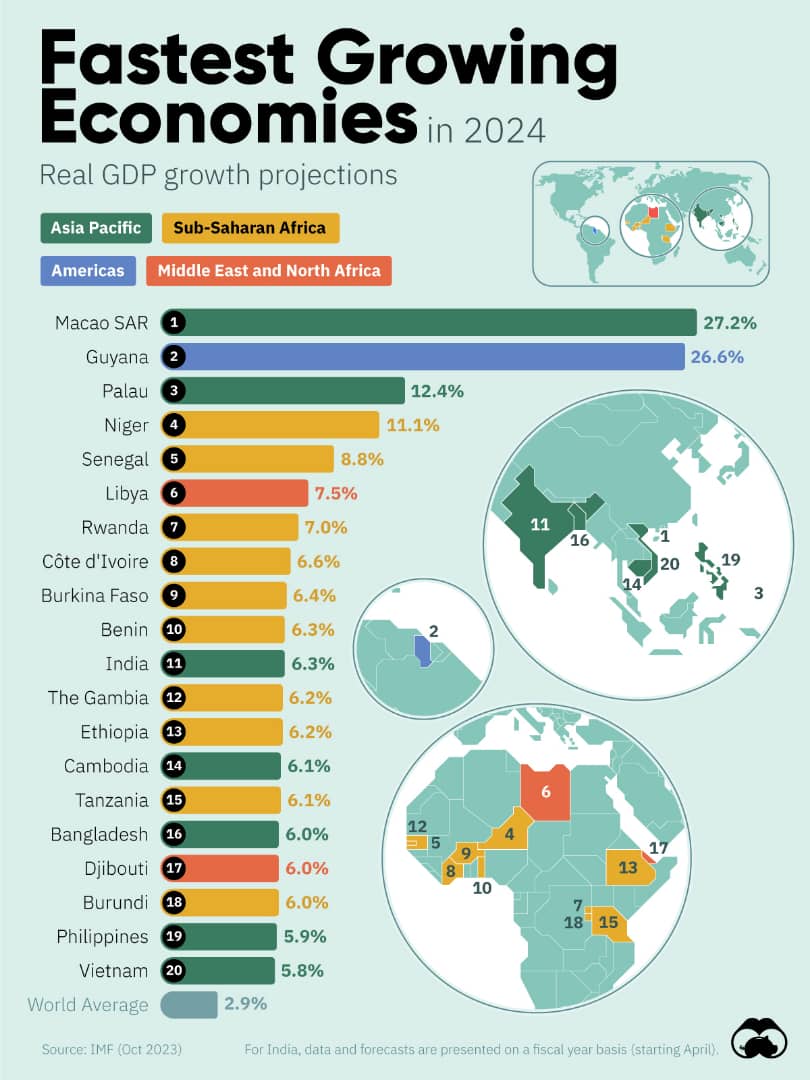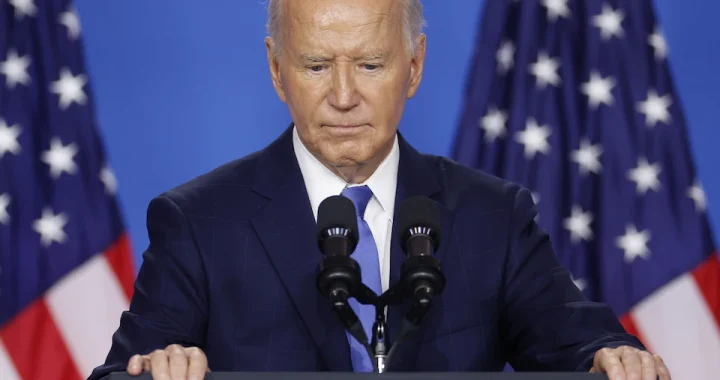11 fastest growing African economies: Projections for 2024 by IMF

While many poorly managed countries in Africa are struggling, 11 of the 20 fastest-growing economies projected in the world for 2024 are African countries.
The projection by the IMF shows that the top 20 economies will grow between 27.2% and 5.8%, while on average, economies globally have been projected to grow by 2.9%. The projections are real GDP projections. The projection is the latest released by the IMF in October 2023.
Real GDP (gross domestic product) is a measure of the total value of all goods and services produced in a country in a given year, adjusted for inflation. It is calculated by dividing nominal GDP by the GDP deflator. The GDP deflator is a measure of the average price level of goods and services in a country.
Real GDP is important because it is a measure of the actual economic output of a country. It is not affected by inflation, so it can be used to compare the economic performance of different countries over time.
Real GDP is also used to calculate other important economic indicators, such as economic growth, GDP per capita, and the unemployment rate
The IMF projections show that some African countries have good leaders and managers of their economies and resources, and they are making headlines by shaping the future of their economies and giving hope to their nationals and businesses, irrespective of the issues that confront them.
While leaders in countries like Ghana are mismanaging resources and depleting gains made over the year, countries such as Niger have been projected to grow at 11.1%. This is the highest growth rate projected for an African country in 2024.
This projection means Niger will be the 4th fastest-growing economy globally in 2024. Niger only came out of a coup this year and is already showing signs of recovery from poor leadership and control of politicians by France, which has refused to recognise the military regime.
11 fastest growing African economies in 2024
The 11 fastest-growing African economies in 2024 per IMF are
- Niger
- Senegal
- Libya
- Rwanda
- Cote D’Ivoire
- Burkina Faso
- Benin
- The Gambia
- Ethiopia
- Tanzania
- Burundi
- Niger will grow by 11.1%
- Senegal will grow by 8.8%
- Libya will grow by 75%
- Rwanda is projected to see 7.0 % growth in 2024
- Cote D’Ivoire is projected to see 6.6% growth in 2024
- Burkina Faso is projected to see 6.4 % growth in 2024
- Benin has the potential to grow at 6.3% in 2024
- The Gambia has the potential to grow at 6.2% in 2024
- Ethiopia has the potential to grow at 6.2% in 2024
- Tanzania has the potential to grow at 6.1% in 2024
- Burundi has the potential to grow at 6.0% in 2024
READ: Richest Countries In Africa Ranked
The implications of the projections on the 11 fastest-growing African economies project for 2024 by the IMF
Should the projections become reality, it will lead to faster economic growth, which can lead to a number of benefits, including:
- Increased employment: As businesses grow and expand, they create new jobs. This can help to reduce unemployment and poverty.
- Rising incomes: As people are employed and earn more money, they have more money to spend on goods and services. This can boost the economy and create a virtuous cycle.
- Improved living standards: Faster economic growth can lead to improvements in living standards, such as better access to healthcare, education, and housing.
- Increased investment: Faster economic growth attracts foreign investment, which can help finance new businesses and infrastructure projects.
These economies are growing rapidly due to their governments implementing reforms to improve the business environment and attract investment. These reforms can help boost economic growth.
Here are some specific examples of how the faster economic growth of these 11 economies could benefit other African economies:
- Increased trade: As these economies grow, they will import more goods and services from other African countries. This will boost the economies of their trading partners. For example, Senegal is expected to import more goods from Côte d’Ivoire and Mali in the coming years.
- New investment opportunities: The faster economic growth of these economies will create new opportunities for African businesses. For example, businesses in Ghana can provide goods and services to the growing economies of Niger and Burkina Faso.
- Job creation: As these economies grow, they will create new jobs. This will benefit people from all over Africa, as there is a lot of labour mobility within the continent. For example, many people from Benin and Mali migrate to Côte d’Ivoire to work in the construction and agricultural sectors.
- Improved infrastructure: The faster economic growth of these economies will lead to investments in infrastructure, such as roads, railways, and ports. This will improve trade and connectivity between African countries. For example, the construction of a new railway line between Tanzania and Rwanda is expected to boost trade between the two countries.
Overall, the faster economic growth of these 11 African economies is a positive development for the entire continent. It has the potential to create jobs, boost incomes, improve living standards, and increase investment.
READ: These are the world’s most powerful passports


 Civil Service Announces 2024 Online Examination Details for Graduate Applicants
Civil Service Announces 2024 Online Examination Details for Graduate Applicants  BREAKING: President Biden Announces Decision Not to Seek Reelection
BREAKING: President Biden Announces Decision Not to Seek Reelection  Real Reason Behind the Appointment of Yohunu as Deputy IGP
Real Reason Behind the Appointment of Yohunu as Deputy IGP  GES 2024-2025 Academic Calendar for Public Schools
GES 2024-2025 Academic Calendar for Public Schools  GES to recruit university graduates and diploma holders-GES Director General
GES to recruit university graduates and diploma holders-GES Director General  Dr. Bawumia’s Smart Phone Credit Will Take 125 Years To Repay: A Misleading Promise
Dr. Bawumia’s Smart Phone Credit Will Take 125 Years To Repay: A Misleading Promise  GES is expected to announce reopening dates for public schools today
GES is expected to announce reopening dates for public schools today